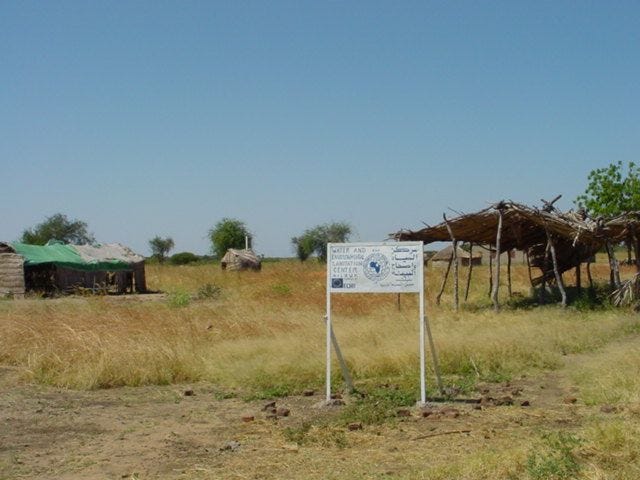‘If liberty means anything at all it means the right to tell people what they do not want to hear’
George Orwell provides a powerful prompt to think, and act, on migration causes.

Possibly with Live Aid came the first globally televised famine as Bob Geldof watched the BBC reports. A BBC news crew were first to document the famine with Michael Buerk stating the situation was ‘the closest thing to hell on Earth’. The best part of forty years later Theguardian.com Somalis are dying: the climate crisis; aid is not the answer stating ‘band aids are not enough’.
In the 1980s, the famine caused mass migration across East Africa, migrations that have continued, grown larger as, sadly, the right to access basic services has stalled and we continue to be challenged. Food as a weapon of war accompanied by the poisoning of water and a general suppression of Rights. Sadly, in our cosseted places watching Live Aid and donating to Comic Relief, we do not always see the heinous actions of the few on the many. These have continued and, over the interceding generations, we have experienced improved ways to alienate people and keep increasingly self-serving leaders in power, elected as well as the usual collection viewed as despots.
Fleeing, not the rather sanitised way we say migration, was, is, the only option to death and destruction.
Have a read of this piece — The Economist How cynical leaders are whipping up nationalism to win and abuse power
“The main drawback of paranoid nationalism is obvious. It is terrible for its targets.”
Many law-abiding citizens go with the flow on this first point. The second element is not so discernible but equally insidious and destructive:
“politics based on bigotry opens the door to misrule and corruption”
Misrule and corruption take different forms, is much closer to home to those reading this in North America and across Europe.
In recent times, people in Afghanistan were part of NATO’s active warfare, people saw a future committed to ‘the Western ways’ and were convinced by the development talk atop the diplomacy linked to armed conflict. There seemed a commitment to making positive change happen. When the mass leaving occurred in 2021, a migration of sorts sponsored by an abdication of responsibilities by Western powers, Afghan people were left to fend for themselves as the Taliban took total control. The legal routes to leave were denied by the paucity of diplomacy, the manner aid and development had been done with inputs and not addressing the underlying causes meant the drive to leave was strong.
The same can be said about Iraq, Syria, Libya and Yemen where politics continue to cause disunity with appeals to this or that ethnic group not for the fulfilment of rights but for power agendas.
Across Africa, Asia and the Americas, the degrading quality of livelihood opportunities for the majority drives migration. The chance to prove oneself. Opportunity to earn and send money home. Remittances are far larger than the aid budgets, this is why organisations are seeking to get involved in the self-organised migration to generate remittances in global currencies. See ‘Prime Africa’ issued by IFAD
Poverty drives migration. Conflict, war at different levels, pushes people to think enough is enough; what hope for our children? Currently 65,600,000 people have been forced from their homes so stated http://theirworld.org/ in 2016. UNHighCommissionerforRefugees places this figure, this toll on people, at 89,300,000 souls in 2022. Of this very large total, there are 4,600,000 asylum seekers. Possibly people do not know their Rights. Probably most people simply want a better opportunity. A chance to have safety for themselves and their families.
But figures are twisted and what are the broad set of issues are contorted when looking at the breakdown of migrants seeking to reach the British Isles across the English Channel. Or should La Manche be a better way to call this sleeve connecting the Atlantic to the North Sea? Have a look at migrationwatchuk.org and it raises further questions not on trying to stop people but on the paucity of efforts to address Decent Work in the places where the people come from. The majority are men, in March 2022 the figures for the previous 3 years were 14,412 men representing 87.4% of the total. 75%, 12,398, were between 18–39 years of age. Such a balance reflects people looking for work or they are men who would be forcibly drawn into conflicts. Poverty of opportunity means seeking work is not exclusive from the need to seek refuge. People want the dignity of working for themselves and their families. They need the protection from exploitation by powers unaccountable to any rule of law most of us would recognise — The Economist How cynical leaders are whipping up nationalism to win and abuse power.
Have a listen to this — Speech by Caroline Lucas (Green Party) regarding Anti Immigration Bill — the facts are there, check them with the other links, and we are talking more about taking forward human development. Noting respect to the environment and how extractive practices have exacerbated migration, we are starting to think much more about stakeholder development (as distinct from shareholder profit) and to look at inclusive economic development. Some of our key academic institutions are consciously or subconsciously noting this UK government response perspective. Note this post -https://www.soas.ac.uk/about/news/soas-awarded-ps125m-boost-impact-migration-and-marginalisation-research “A flexible funding model will allow SOAS researchers to respond quickly to address urgent UK, European and global challenges, and harness the power of coalitions with business, the public sector, and other stakeholders to improve policy and practice.” the agenda clearly reflects the funding sources ‘urgent UK, European and global challenges’. We appear to be focusing on how (political) effect is being portrayed rather than research to look at cause, effect and how to work accordingly in a win-win approach.
Migration Observatory Oxford University presents a broader set of fiscal considerations in terms of the direct impact on the UK’s economy. Acknowledged as not being the complete setting it makes point recent immigration policy is driven by, and panders to, a particular set of agendas in the UK’s governing, The Conservative, party. Recent migration patterns reflect the politically heightened status of Ukraine. Previous furores surrounded possible British, European, angst over Afghanistan, Syria, Libya and Iraq; but only while they were headline news. It does not show how protracted developmental and governance challenges in other key countries drive migration flows when headed to Europe (and the British Isles is still part of geographic Europe).
It is this last point where further work is ongoing. Charities, not-for-profits, the United Nations, are continually asking the British public, directly and through our governmental representatives, to fund humanitarian and developmental projects responding to the effects whilst political and diplomatic work seems impotent in addressing the causes.
As Abdishakur writes in The Guardian, aid, humanitarian response, is not the answer. It may salve the conscience of the giver; but it will not address the fundamentals driving migration.
Bright lights, economic opportunities, attract. The possibility of Rights and rule of law are still big factors for people who recall the positives of British engagement (and there are some positives). Why not move the bright lights and economic opportunities to save people putting money into people smugglers’ pockets? Issues of modern slavery abound — the abuse of women and children regularly reported because criminal gangs are able to usurp weak states and poor governance.
Aid and piecemeal development will not be the answer.
We are seeing the use of a new term encompassing good strategic thinking, resultant quality programming and engaged, inclusive project design — Humanitarian — Development — Peace nexus. Take a read — Reliefweb — HDP challenges in doing itand Oxfam HDP nexus what-does-it-mean. Plenty more out there if interested as we all are caused to think further regarding migration as climate change bites and, seemingly, good governance runs into trouble. It provides critical aspects of thinking for all of us in multi-cultural societies on a planet that is connected by our problems but, seemingly not so connected by solutions as popularist politicians seek to hang on to power.
The test of real power is being able to give the power away.
A few questions after the journey from the 80s to now and how media is used:-
- Where are you? Probably purposeful in intent, reinforced by giving to your chosen charity.
- How does your purpose, the organisation you work for, fit to the broader elements granting people fresh meaning to their lives?
- Where are we positioning in terms of granting people voice to build good governance?
- How are any of us assisting and supporting the achievement of basic rights?
- Do you have the facts to counter negativity and have the confidence to speak out when people say you cannot come to ‘our’ bright lights?
- How are we working to develop the tools for people to use their own talents and abilities to solve not just the immediate problem but have the capability to take forward problem solving?
- How are we doing with our own humility? Realising unless we work together, we will all be overwhelmed by global challenges.
